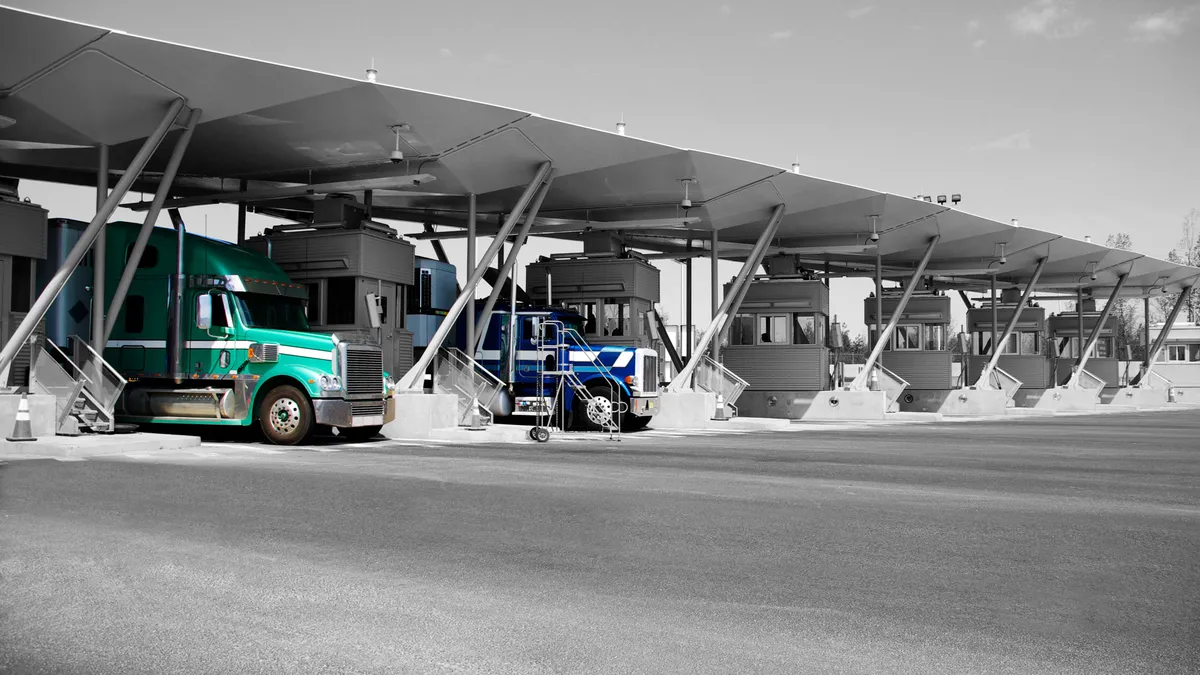Dive Brief:
- The fifth round of talks to renegotiate the North American Free Trade Agreement (NAFTA) concluded Tuesday, with ample concerns over progress among the negotiating parties.
- U.S. Trade Representative (USTR) Robert Lighthizer said he was concerned by "the lack of headway," claiming Mexico and Canada are unwilling to seriously negotiate a "rebalanced agreement." He warned, "absent rebalancing, we will not reach a satisfactory result."
- The next round of talks will take place in Montreal, Canada, from January 23 to 28, 2018. Negotiators will meet in Washington, D.C., to continue working on the trade deal throughout mid-December.
Dive Insight:
Time is running out for the negotiating parties, but instead of breaking through on some key deals, tensions are as high as ever, with just two rounds left in the planned process.
Official statements revealed "progress was made" on various issues — including anti-corruption, telecommunications, good regulatory practices, electronic commerce and trade facilitation — but no chapters were concluded this round.
Unfortunately, these are the same issues the negotiators have been making progress on since at least the second round. In fact, reports indicate negotiations are still being held back by the same controversial proposals.
"There are some areas where some extreme proposals have been put forward, and these are proposals that we simply cannot agree too," Canada's Foreign Affairs Minister Chrystia Freeland told reporters in Ottawa, according to CBC News.
These extreme proposals include the so-called sunset clause, wherein NAFTA would be renegotiated every five years, and a U.S. proposal to tighten rules of origin so that 50% of North American autos were produced in the U.S. and requiring 85% regional content, among others.
"I've been married for 19 years, when my husband asked me to marry him he didn't say every five years we're going to check whether we want to get divorced or not. We don't think that's a good foundation for a lasting relationship," Freeland said.
Perhaps the unwillingness to accept U.S. proposals is why Lighthizer believes Canada and Mexico are the cause behind the "lack of headway" in recent talks. President Donald Trump frequently argued NAFTA was a bad deal, and ill-negotiated, and such "extreme proposals" could be a way to leverage concessions as the talks near an end. The onus, as the U.S. seems to see it, lies on Canada and Mexico to save the deal.
"Our teams will be meeting again next month in Washington," Lighthizer said in his statement. "I hope our partners will come to the table in a serious way so we can see meaningful progress before the end of the year."
However, Canada and Mexico argue they cannot shift their position because the U.S. stance is inherently flawed. The New York Times reports that instead of presenting a counter-proposal on auto rules of origin at the recent talks, Canada and Mexico instead came to the talks with data suggesting the rule was a mistake, and would actually inflict greater harm on the U.S. and North American auto industry.
Traces of this contempt for the U.S. negotiating position can also be found in Mexico's official statement after the talks.
In his assessment of the talks, Lighthizer argued Mexico and Canada seem unwilling to negotiate a rebalanced deal. Mexico replied, stating, "a successful modernization of NAFTA can effectively contribute to a rebalancing of trade relations in North America, driving more commerce and new investment opportunities. From Mexico's perspective, proposals that imply restricting commerce do not contribute to that end, nor to the goal of increasing the region's competitiveness."
"Mexico reaffirms that a successful NAFTA modernization must benefit the three NAFTA partners and the proposals that form part of the negotiation must be oriented to that objective," according to the Spanish-language statement following the fifth round of negotiations.
As it stands, it does not look as if any country is ready to compromise on these major proposals. The question is whether this lack of compromise will derail the deal altogether, or the timeline any further. Canada's position, at least, is to "hope for the best and prepare for the worst," according to Freeland. Perhaps supply chain managers should do the same.














